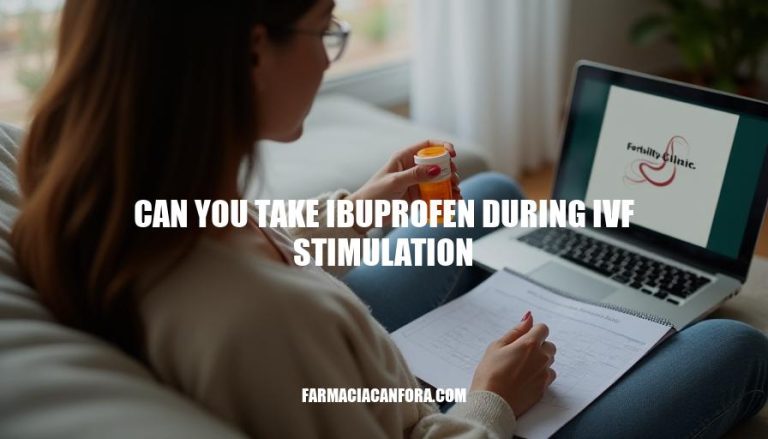


Understanding medication use during IVF stimulation is crucial for the success of the treatment. While some clinics allow the use of ibuprofen during the early stages of stimulation, it is generally advised to stop before the hCG trigger shot. This is because certain medications can interfere with the delicate hormonal balance required for successful egg retrieval and embryo development. Always consult your doctor before taking any medication during IVF to ensure the best possible outcome.
During IVF stimulation, the use of ibuprofen (Advil®, Motrin®) is generally allowed but with specific guidelines:
Always consult your healthcare provider for personalized advice.
Taking ibuprofen during IVF stimulation can pose several risks:
Ovarian Response: Ibuprofen, a nonsteroidal anti-inflammatory drug (NSAID), can inhibit the expansion and growth of the ovaries. This can counteract the effects of the stimulation medications, potentially leading to a reduced ovarian response.
IVF Success Rates: By affecting ovarian response, ibuprofen may indirectly lower the chances of successful egg retrieval and overall IVF success rates.
Hormonal Interference: NSAIDs like ibuprofen can interfere with the hormonal environment necessary for follicle development and maturation.
It’s crucial to consult with your fertility specialist before taking any medication during IVF treatment.
Here are some alternative pain management options during IVF stimulation that are considered safe and might be preferred over ibuprofen:
Acetaminophen (Paracetamol): Unlike ibuprofen, acetaminophen does not interfere with fertility medications or hormone levels, making it a safer choice during IVF.
Cold Compresses: Applying a cold compress to the injection site can help reduce pain and swelling without the need for medication.
Hot Compresses: Using a warm compress can relax muscles and alleviate discomfort from injections.
Topical Anesthetics: Numbing creams or sprays can be applied to the skin before injections to minimize pain.
Relaxation Techniques: Practices such as deep breathing, meditation, and gentle yoga can help manage pain and reduce stress, which is beneficial during IVF.
These alternatives are preferred over ibuprofen because they do not pose risks of interfering with fertility treatments or causing hormonal imbalances.
Many patients have shared their experiences with IVF stimulation, and a common theme is the advice to avoid ibuprofen. For instance, one patient mentioned that her fertility specialist strictly advised against using ibuprofen due to its anti-inflammatory properties, which could interfere with the ovaries’ ability to expand and grow during stimulation. She shared that she switched to acetaminophen (Tylenol) for pain relief, which was effective and didn’t impact her treatment.
Another patient recounted feeling anxious about managing pain without her usual go-to, ibuprofen. However, she found that using ice packs and taking acetaminophen helped manage her discomfort without compromising her IVF cycle.
These personal stories highlight the importance of following medical advice during IVF and finding alternative pain management strategies that support the treatment process.
Taking ibuprofen during IVF stimulation is generally allowed, but with specific guidelines and warnings. It’s essential to consult your doctor before taking any medication during IVF treatment.
Ibuprofen can interfere with ovarian response, IVF success rates, and hormonal balance. Alternative pain management options like acetaminophen, cold compresses, hot compresses, topical anesthetics, and relaxation techniques are preferred over ibuprofen due to their safety and effectiveness.
Always consult your healthcare provider for personalized advice on managing pain during IVF stimulation.